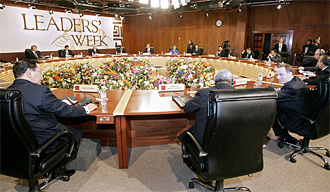
|  |  |  Business News | November 2008 Business News | November 2008  
Pacific Rim Leaders Pledge Cooperation and Renounce Protectionism
 International Herald Tribune International Herald Tribune
go to original


| | Leaders of the countries that belong to the Asia Pacific Economic Cooperation, or APEC, in Lima, Peru, on Saturday. (Eisaku Osada/Associated Press) | | |
Lima - Leaders of nations around the Pacific Rim promised to work together to combat the global economic crisis and pledged to refrain from forming new barriers to trade and investment.

Leaders of the 21-nation Asia-Pacific Economic Cooperation group, or APEC, which includes the United States, China and Japan, also called for improved corporate governance and supported efforts to thaw frozen credit markets.

"We have already taken urgent and extraordinary steps to stabilize our financial sectors and strengthen economic growth and promote investment and consumption," the group said during its meeting in Lima. "We will continue to take such steps, and work closely, in a coordinated and comprehensive manner, to implement future actions."

The meeting comes as the global economic downturn is deepening. APEC leaders warned that any attempt to shield home markets from overseas competition would only prolong the slump.

Statements by individual leaders, like President Felipe Calderón of Mexico, reflected unease over the political transition in the United States, where President-elect Barack Obama has expressed reservations about free trade agreements.

Calderón warned Obama against trying to renegotiate the North American Free Trade Agreement, or Nafta, saying that restricting commerce would only encourage illegal Mexican migration to the United States.

President George W. Bush complained that Congress had not approved pending trade deals with Colombia and South Korea.

"One of the enduring lessons of the Great Depression is that global protectionism is a path to global economic ruin," Bush said at the meeting.

However, Bush was able to achieve victories on his two top priorities, winning endorsements for an economic action plan and agreement by his partners for a new round of discussions in December aimed at halting the North Korean nuclear program.

APEC members also said their governments were committed to reaching an agreement on the Doha round of World Trade Organization negotiations next month. The talks began in 2001, and negotiators have failed year after year to agreeing on even the outlines of a deal.

Leaders from the Group of 20 nations last week laid out regulatory proposals to prevent a recurrence of the financial crisis. APEC leaders said Saturday that they supported the G-20 plan and backed the broad policy response that they said was needed to restore growth and stability to global markets.

Asia-Pacific governments and their counterparts around the world are spending hundreds of billions of dollars and implementing new policies to prevent the financial and economic crisis from worsening.

The statement Saturday did not spell out what future economic stimulus measures the members of APEC might take.

The leaders called for a tightening of standards on corporate governance and risk management in the financial industry.

Russia and Japan discuss feud

President Dmitri Medvedev of Russia held talks with U.S. and Japanese leaders on the edges of the summit meeting, Reuters reported from Lima.

Prime Minister Taro Aso of Japan told Medvedev that he would like to see an end to a territorial dispute that has soured bilateral ties since the end of World War II.

For more than 60 years, Moscow has been reluctant to discuss Japan's demands that Russia return four tiny disputed Pacific Ocean islands seized by the Red Army in the final days of the war. The dispute over the territories, known as the Southern Kuriles in Russia and the Northern Territories in Japan, has prevented the two states from signing a formal peace treaty since the war ended.

"The problem remains an element which destabilizes the situation in the region," Aso told Medvedev on Saturday.

Medvedev also met with Bush on Saturday. The meeting came against a backdrop of chilly U.S.-Russian relations after the war with Georgia in August and Washington's moves to base a missile defense system in Eastern Europe.

"It's an interesting moment, because I've had a lot of meetings with Dmitri and Vladimir Putin," said Bush, who once famously told reporters he had gotten a sense of Putin's soul. "This will be my last meeting as the sitting president with the leader of Russia."

Bush and Medvedev discussed a range of topics, from the Georgia conflict and missile defense to the Iranian nuclear program, officials for the two sides said. They agreed to explore a joint strategy toward the recent bout of piracy off the Horn of Africa. |

 |
|  |



